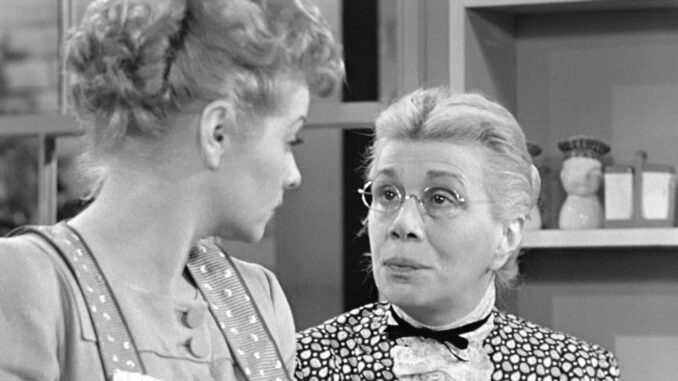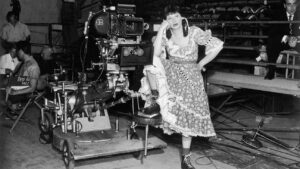
Introduction: The Beginning of a TV Legend
When “I Love Lucy” premiered on October 15, 1951, it wasn’t just another sitcom—it was the dawn of a cultural phenomenon. Lucille Ball and Desi Arnaz brought their undeniable chemistry to the small screen, captivating millions of viewers. But what did critics think of the show’s very first episode? The Hollywood Reporter’s 1951 review provides a fascinating snapshot of the show’s debut and its groundbreaking impact on television history. Let’s dive into how THR viewed Lucy’s comedic genius and why the show remains iconic.
Why ‘I Love Lucy’ Was a Game-Changer
A New Era of Television
Before “I Love Lucy,” most sitcoms were shot live in front of a studio audience or broadcasted as radio adaptations. This show revolutionized TV production by introducing the multi-camera setup and filming in front of a live audience. It was a gamble that paid off, offering unmatched energy and authenticity.
Lucille Ball’s Star Power
Lucille Ball wasn’t new to entertainment in 1951. Known for her work in radio and film, Ball’s transition to TV was a bold move. THR praised her comedic timing, calling her “a natural in the realm of physical comedy.”
Desi Arnaz: The Perfect Foil
Desi Arnaz brought more than just charm; his role as Ricky Ricardo introduced diversity to American screens. Critics noted the dynamic between Ball and Arnaz as one of the show’s strongest elements.
What THR Said About the First Episode
The Plot That Hooked America
The premiere episode, “The Girls Want to Go to a Nightclub,” set the tone for the series. Lucy and Ethel’s antics, paired with Ricky and Fred’s reactions, showcased the perfect blend of slapstick and situational comedy. THR highlighted the episode’s “universal humor,” making it relatable to audiences everywhere.
Praise for Comedy Timing
THR lauded Ball’s comedic timing, stating, “Lucille Ball’s expressions and physicality bring the script to life in a way no other actress could.” Her ability to make even mundane scenarios hilarious set her apart.

Criticism of Early Pacing
Not everything was perfect. The review noted that the pacing of the first episode felt slightly uneven, with some jokes taking longer to land. However, this was quickly overshadowed by the show’s charm.
Breaking Down the Iconic Elements of Episode One
1. The Chemistry Between Lucy and Ricky
From the start, Lucy and Ricky’s playful banter felt authentic. Their real-life marriage added depth to their on-screen relationship, a fact THR mentioned as a unique selling point.
2. Ethel and Fred: The Perfect Sidekicks
Ethel and Fred Mertz weren’t just supporting characters—they were comedic gold. Their bickering and camaraderie balanced the Lucy-Ricky dynamic perfectly.
3. Physical Comedy at Its Best
Lucy’s ability to turn everyday situations into laugh-out-loud moments was unparalleled. The nightclub scene in the first episode showcased her knack for physical comedy.
4. A Glimpse Into Domestic Life
The show’s focus on domestic life resonated with 1950s audiences. From Lucy’s schemes to Ricky’s exasperation, it reflected relatable marital dynamics with a humorous twist.
The Legacy of ‘I Love Lucy’s Premiere
Setting the Standard for Sitcoms
“I Love Lucy” didn’t just entertain—it set the bar for sitcoms to come. The multi-camera format, live audience, and episodic humor became staples of the genre.
Paving the Way for Female Comedians
Lucille Ball’s success shattered glass ceilings for women in comedy. Her portrayal of Lucy Ricardo proved that women could lead a show and dominate the comedy world.
Cultural Relevance Decades Later
Even today, the themes and humor of “I Love Lucy” remain timeless. The show’s ability to make audiences laugh and connect emotionally is a testament to its brilliance.
What Modern Viewers Can Learn from THR’s Review
1. Timeless Humor
The review emphasized the universal appeal of Lucy’s humor. Modern sitcoms can still learn from her blend of physical comedy and sharp wit.
2. The Power of Chemistry
The natural chemistry between the cast was a key factor in the show’s success. Today’s TV creators often cite “I Love Lucy” as inspiration for ensemble casts.
3. Taking Creative Risks
The show’s innovative production techniques were risky but ultimately transformative. Aspiring creators should take note of the importance of innovation.
Behind-the-Scenes: How the Episode Was Made
The Multi-Camera Revolution
Desi Arnaz and cinematographer Karl Freund pioneered the multi-camera technique, forever changing how sitcoms were filmed.
Live Audience Energy
Filming in front of a live audience added an irreplaceable layer of authenticity. The laughter you hear in the episode is real, making the experience more engaging.
A Collaborative Effort
The success of the first episode was a team effort, with writers, directors, and actors all contributing to its magic.
Conclusion: Why ‘I Love Lucy’ Endures
The Hollywood Reporter’s 1951 review captured the magic of “I Love Lucy’s” debut, highlighting its humor, innovation, and heart. Decades later, the show remains a touchstone of American television, beloved by audiences of all ages. Its premiere wasn’t just the start of a sitcom—it was the beginning of a legacy.
FAQs
1. What was the first episode of ‘I Love Lucy’ about?
The premiere episode, “The Girls Want to Go to a Nightclub,” revolved around Lucy and Ethel scheming to switch plans with Ricky and Fred for a fun night out.
2. Why is ‘I Love Lucy’ considered groundbreaking?
The show introduced the multi-camera setup, live audience filming, and featured a female lead in a comedy role, which was revolutionary at the time.
3. How did critics respond to the first episode in 1951?
Critics, including THR, praised the humor, cast chemistry, and Lucille Ball’s comedic genius, though some noted minor pacing issues.
4. What made Lucille Ball’s performance unique?
Her unmatched comedic timing, physical humor, and expressive acting set her apart as a trailblazer in comedy.
5. Is ‘I Love Lucy’ still relevant today?
Absolutely! Its themes of love, friendship, and humor continue to resonate, making it a timeless classic for modern audiences.